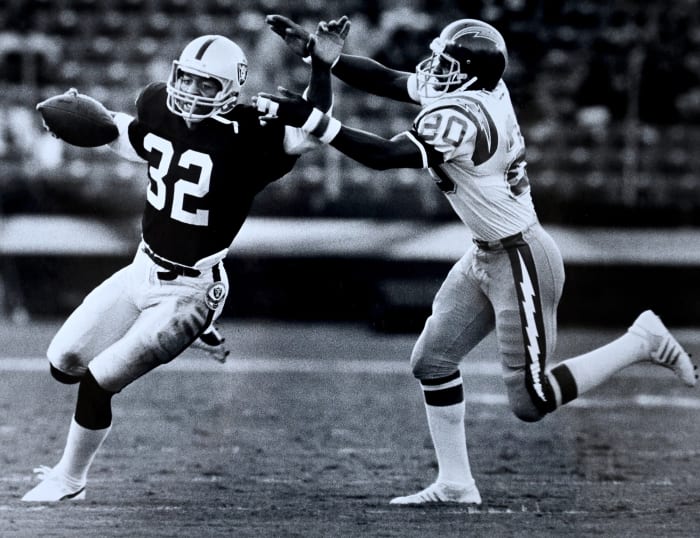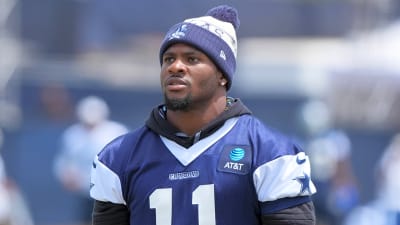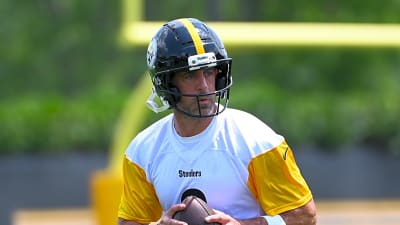- Home
- Quizzes
- My Quiz Activity
- Newsletters
- MY FAVORITES
- Add Sports/Teams
- SPORTS
-
NFL
- NFL Home
- Arizona Cardinals
- Atlanta Falcons
- Baltimore Ravens
- Buffalo Bills
- Carolina Panthers
- Chicago Bears
- Cincinnati Bengals
- Cleveland Browns
- Dallas Cowboys
- Denver Broncos
- Detroit Lions
- Green Bay Packers
- Houston Texans
- Indianapolis Colts
- Jacksonville Jaguars
- Kansas City Chiefs
- Las Vegas Raiders
- Los Angeles Chargers
- Los Angeles Rams
- Miami Dolphins
- Minnesota Vikings
- New England Patriots
- New Orleans Saints
- New York Jets
- New York Giants
- Philadelphia Eagles
- Pittsburgh Steelers
- San Francisco 49ers
- Seattle Seahawks
- Tampa Bay Buccaneers
- Tennessee Titans
- Washington Commanders
-
MLB
- MLB Home
- Athletics
- Arizona Diamondbacks
- Atlanta Braves
- Baltimore Orioles
- Boston Red Sox
- Chicago White Sox
- Chicago Cubs
- Cincinnati Reds
- Cleveland Guardians
- Colorado Rockies
- Detroit Tigers
- Houston Astros
- Kansas City Royals
- Los Angeles Angels
- Los Angeles Dodgers
- Miami Marlins
- Milwaukee Brewers
- Minnesota Twins
- New York Yankees
- New York Mets
- Philadelphia Phillies
- Pittsburgh Pirates
- San Diego Padres
- San Francisco Giants
- Seattle Mariners
- St. Louis Cardinals
- Tampa Bay Rays
- Texas Rangers
- Toronto Blue Jays
- Washington Nationals
-
NBA
- NBA Home
- Atlanta Hawks
- Boston Celtics
- Brooklyn Nets
- Charlotte Hornets
- Chicago Bulls
- Cleveland Cavaliers
- Dallas Mavericks
- Denver Nuggets
- Detroit Pistons
- Golden State Warriors
- Houston Rockets
- Indiana Pacers
- Los Angeles Clippers
- Los Angeles Lakers
- Memphis Grizzlies
- Miami Heat
- Milwaukee Bucks
- Minnesota Timberwolves
- New Orleans Pelicans
- New York Knicks
- Oklahoma City Thunder
- Orlando Magic
- Philadelphia 76ers
- Phoenix Suns
- Portland Trail Blazers
- Sacramento Kings
- San Antonio Spurs
- Toronto Raptors
- Utah Jazz
- Washington Wizards
-
NHL
- NHL Home
- Anaheim Ducks
- Boston Bruins
- Buffalo Sabres
- Calgary Flames
- Carolina Hurricanes
- Chicago Blackhawks
- Colorado Avalanche
- Columbus Blue Jackets
- Dallas Stars
- Detroit Red Wings
- Edmonton Oilers
- Florida Panthers
- Los Angeles Kings
- Minnesota Wild
- Montreal Canadiens
- Nashville Predators
- New Jersey Devils
- New York Islanders
- New York Rangers
- Ottawa Senators
- Philadelphia Flyers
- Pittsburgh Penguins
- San Jose Sharks
- Seattle Kraken
- St. Louis Blues
- Tampa Bay Lightning
- Toronto Maple Leafs
- Utah Mammoth
- Vancouver Canucks
- Vegas Golden Knights
- Washington Capitals
- Winnipeg Jets
- NCAAF
- NCAAM
- Olympics
- Boxing
- Entertainment
- Lifestyle
- Golf
- MMA
- Soccer
- Tennis
- Wrestling
- Sports Betting
- More Sports
- RESOURCES
- My Account
- YB on Facebook
- YB on Twitter
- YB on Flipboard
- Contact Us
- Privacy Policy
- Terms of Service

What a rush: The 25 greatest seasons by rookie NFL running backs
Running backs regularly enter the NFL ready to roll, and many of the game's all-time greats have offered immediate impact. Here are the greatest seasons by rookie RBs.
25. Marcus Allen, Los Angeles Raiders (1982)

Too good for an honorable mention, Allen nevertheless saw his rookie season cut short due to a players' strike that reduced that slate to nine games. The Raiders' 1982 first-round pick, Allen soared to an NFL-most 1,098 scrimmage yards and also led the league with 14 touchdowns. Extrapolated over 16 games, that works out to 1,952 yards from scrimmage. Although Allen and Al Davis later engaged in a simmering feud, the former Heisman winner became the central piece for the team from the jump. The future MVP, who also added three TDs in two Los Angeles playoff games, remained as such until Bo Jackson's 1987 arrival.
24. Kareem Hunt, Kansas City Chiefs (2017)

Moving on from Jamaal Charles after injuries slowed him, the Chiefs found a low-cost replacement in Hunt. The third-round pick displayed immediate tackle-shedding ability and provided the Chiefs' final Alex Smith-piloted offense with a significant backfield upgrade. Hunt skated to a rushing title, getting there despite taking just one handoff -- to secure the title -- in Kansas City's regular-season finale. Hunt finished with just 1,327 yards, marking the second-lowest rushing title showing in the 16-game era (strike seasons excluded) and saw a better 2018 season end early after video surfaced of him assaulting a woman. The Chiefs re-signed Hunt six years later.
23. Clinton Portis, Denver Broncos (2002)

The consensus second-best running back to stop through under Mike Shanahan in Denver, Portis proved lethal behind the Broncos' zone-blocking O-line. A second-round pick who was part of the Miami Hurricanes' all-time great 2001 team, Portis seized the job shortly after Davis' August 2002 retirement. Portis topped Terrell Davis' rookie-year number by rushing for 1,508 yards and totaling 17 touchdowns. In a strong running back period, Portis ranked fourth in the NFL in both categories that season. The Offensive Rookie of the Year punctuated the showing with a four-TD Week 15 game against the Chiefs and a 228-yard outing in Week 17 against the Cardinals.
22. Mike Anderson, Denver Broncos (2000)

Not matching most on this list in terms of skill, Anderson still delivered when called upon. The Broncos saw Terrell Davis' rehab from a season-ending 1999 knee injury lead to a Week 1 injury, and 1999 fill-in Olandis Gary also went down. Gary suffered an ACL tear in a shootout season-opening loss to the Rams. Enter Anderson, a sixth-round pick who was in his age-27 season due to military service. Running behind an elite O-line, Anderson stampeded to 1,487 rushing yards and 15 touchdowns. He got there despite Davis keeping him a nonfactor in three games. Anderson's surge included a then-rookie-record 251 during a December win over the Saints.
21. Tony Dorsett, Dallas Cowboys (1977)

Statistically, Dorsett checks in with an unremarkable 1,007 rushing yards. but he struggled to fit into Tom Landry's scheme early in his debut season. This ultimately led to the Cowboys rejiggering their approach to fit Dorsett, who would go on to be one of the defining running backs of his era. Dorsett only produced two 100-yard games, one of which a 206-yarder against the Eagles, but did add four playoff touchdowns to run his combined count to 16. The Heisman-winning speedster, whom Dallas traded up for at No. 2 overall, refueled the NFC power's offense to open a window for two more Landry-era Super Bowl berths.
20. Jamal Lewis, Baltimore Ravens (2000)

Priest Holmes became an All-Pro and a fantasy icon in Kansas City; Baltimore set its previous starter's departure in motion by choosing Lewis fifth overall in 2000. Demoting Holmes, the Ravens put their first-round pick to work as a rookie. Lewis became the centerpiece of an offense that did not score a touchdown in five straight games around the midseason point. As the Ravens gave Trent Dilfer the keys, they leaned on Lewis, who finished the regular season with 1,660 scrimmage yards. While the Tennessee alum only scored six TDs, he added four more in the playoffs and rumbled to two more 100-yard outings -- including in Super Bowl XXXV.
19. Alfred Morris, Washington (2012)

Famous for churning out rushing production regardless of the running back, Mike Shanahan saw one of his Washington cogs accumulate more rookie-year yardage than any of his Denver pieces. Teaming with Robert Griffin III at what turned out to be his peak, Morris picked up 1,613 rushing yards and 13 TDs. A sixth-round pick, Morris was not a dynamic talent; he amassed just 77 receiving yards. But he earned second-team All-Pro recognition and played a lead role in Washington's NFC East championship. He closed the regular season with a 200-yard day against Dallas, and his 2012 total remains fourth among rookies in NFL history.
18. Charley Taylor, Washington (1964)

Predating Alvin Kamara's 800/700 rookie season by 53 years, Taylor showed skills that prompted Washington to shift him to wide receiver. The team drafted the future Hall of Famer as a tailback and turned him loose alongside another RB-turned-WR (Bobby Mitchell) in Sonny Jurgensen's first year at the helm. Washington featured a historically versatile offense, and Taylor -- the No. 3 overall pick -- dazzled with 814 receiving yards and 755 more on the ground. He and Mitchell each scored 10 touchdowns that season; Washington did not follow through with a full-time Taylor position change until 1967.
17. Beattie Feathers, Chicago Bears (1934)

Launching in 1920, the NFL saw one 1,000-yard rusher over its first 27 seasons. It came from a rookie. A two-sport athlete who later spent nearly a decade in minor league baseball, Feathers starred at Tennessee and with the Bears for one magical season. The then-25-year-old halfback is credited with 1,004 yards on just 119 carries -- 8.4 a pop (still an RB record). Inconsistent stat collecting from an era in which data was difficult to find cast some doubt on Feathers' number, as he missed two games that season and never eclipsed 350 yards again. But the rushing total remained an NFL rookie record until the Chargers' Don Woods reached 1,162 in 1974.
16. Marshall Faulk, Indianapolis Colts (1994)

The Colts held two top-six picks in 1994. Mel Kiper Jr. famously gave them heat for the second of those choices (linebacker Trev Alberts), but no criticism centered on the No. 2 overall pick. Faulk, a former San Diego State superstar, hit the ground running by amassing 174 scrimmage yards in his debut. The dual-threat dynamo kept going, finishing the season with 1,804 scrimmage yards and 12 touchdowns. This earned Faulk second-team All-Pro acclaim and provided a glimpse into a Hall of Fame career. Faulk played five seasons with the Colts, being traded to the Rams in 1999. He helped ignite a historic St. Louis ascent.
15. Jerome Bettis, Los Angeles Rams (1993)

Bettis collecting a Super Bowl win in his final season, settling into a short-yardage role by the time Ben Roethlisberger arrived, may distort his career image a bit. While Bettis' "The Bus" years in Pittsburgh earned him Hall of Fame entry, he made a fearsome debut as a power rusher who vied with Emmitt Smith for the rushing title. The No. 10 overall pick steamrolled to 1,429 rushing yards, totaling five 100-yard days over the Rams' final six games. This came for a downtrodden team without a particularly strong O-line. Averaging 4.9 yards per carry, Bettis earned first-team All-Pro acclaim during the first of his three Rams seasons.
14. George Rogers, New Orleans Saints (1981)

A woeful Saints team received an immediate run-game jolt by taking Rogers. Although this probably was the wrong decision from a long-term perspective, as Lawrence Taylor went second overall, Rogers did his job and then some. The South Carolina alum brought a well-rounded game that produced an NFL-leading 1,674 rushing yards. Rogers deserves extra credit for doing so on the NFL's worst franchise at this point. He delivered nine 100-yard games as a rookie, efficiently carving up defenses during a 378-carry slate. Rogers four seasons in New Orleans but could not match this debut effort over his career's remainder.
13. Alvin Kamara, New Orleans Saints (2017)

Kamara did not reach Faulk's scrimmage yards number, settling at 1,554. But the instantly electrifying Saints Mark Ingram complement checked in well north of the Hall of Famer's debut in terms of yards per touch. Kamara averaged 7.7 per touch -- to Faulk's 4.9 -- and made a significant difference in the Saints' prospects. New Orleans finished 11-5 that season, with Ingram and Kamara becoming the first teammates to surpass 1,500 scrimmage yards in a season. Kamara, a third-round pick, averaged an NFL-most 6.1 yards per carry en route to Offensive Rookie of the Year honors. This space voted him the best RB in Saints history.
12. Billy Sims, Detroit Lions (1980)

Young RB dynamos kept coming in the late 1970s and early '80s; Sims added another impact back to the mix. The No. 1 overall pick glided to second-team All-Pro acclaim and led the NFL in touchdowns (16). Sims added 621 receiving yards to his 1,303-yard ground total. The Oklahoma alum immediately showed the upgrade the Lions made by amassing 217 scrimmage yards in Week 1 against the defending NFC champion Rams. He topped that with 228 in a win over the Packers a week later, entering Week 3 with five TDs. Sims would have likely begun his career 4-for-4 in 1,000-yard rushing seasons were it not for the 1982 players' strike. A career-ending knee injury stalled his Hall of Fame path in 1984.
11. O.J. Anderson, St. Louis Cardinals (1979)

Anderson arrived during a bleak period for the Cardinals; he became an instant ray of hope. A good-sized back who brought some elusiveness early in his career, Anderson came to St. Louis as a top-10 pick. He justified it by rushing for 1,605 yards and adding 308 more through the air. Earl Campbell won MVP honors in his second season, but Walter Payton was in his prime at this point. Anderson still outflanked the Bears legend for first-team All-Pro honors alongside Campbell. Anderson slithered to 193 yards in his first game -- against the defending NFC champion Cowboys -- and totaled nine 100-yard outings that year.
10. Curt Warner, Seattle Seahawks (1983)

Fifteen years before an unlikely upstaging by a similarly named quarterback, Warner was a catalyst for a set of strong Seahawks teams . Seattle made the transition from Jim Zorn to Dave Krieg during the 1983 season, and the younger undrafted free agent benefited from the rookie running back. Warner motored to a 1,449-yard, 14-touchdown season, helping elevate the Seahawks to the first playoff berth in franchise history. Once there, the team took down rookie versions of John Elway and Dan Marino, and the Dolphins upset involved 151 Warner scrimmage yards and two TDs. A major 1984 injury paused Warner's ascent, but he delivered productive years down the road.
9. Barry Sanders, Detroit Lions (1989)

Offering a unique skill set that may well remain the most exciting in NFL history, Sanders elevated the stature of No. 20 in Detroit. The Lem Barney and Billy Sims successor rocketed to first-team All-Pro honors to begin the greatest RB highlight reel in NFL annals. Coming into the league after an otherworldly 1988 season at Oklahoma State, his one year as a college starter, Sanders vied for the rushing title with Chiefs bulldozer Christian Okoye. The Lions' stop-start wizard finished with 1,470 yards and 14 TDs, missing one game. Fumbles (10) were an issue, but Sanders never approached that total again in his dazzling career.
8. Adrian Peterson, Minnesota Vikings (2007)

The Vikings nabbed one of this century's top running back prospects in Round 1. Peterson immediately became a top-tier NFL back, averaging 5.6 yards per carry on 238 totes. The future Hall of Famer reached 1,341 rushing yards despite missing two games; two of those included 220-plus. After a 224-yard showing against the Bears, Peterson set a still-standing NFL record by reaching 296 against the Chargers. Matching up against LaDainian Tomlinson, Peterson outgained the San Diego great by 256 yards and added a 19-yard reception, running wild against the eventual AFC West champions despite the Vikings needing to turn to backup QB Brooks Bollinger during the game.
7. Ezekiel Elliott, Dallas Cowboys (2016)

The Cowboys transformed their offense in 2016, leading to a 13-win season that included the team resting starters in Week 17. Elliott was the planned addition; Dak Prescott, the eventual Offensive Rookie of the Year, was not. The No. 4 overall pick, Elliott (and a three-All-Pro O-line) gave Prescott an elite run game on which to fall back. The Ohio State product won the rushing title (1,631 yards), finishing with 1,994 yards from scrimmage, and scored 16 touchdowns. The Cowboys managed to earn the NFC's top seed despite a career-altering Tony Romo injury. Elliott then did his part in a shootout loss to the Packers, posting a 125-yard rushing day.
6. Saquon Barkley, New York Giants (2018)

Chosen second overall, Barkley represented the rare top-five modern running back investment. Positional value spawned debates, but the Penn State product showed he was among the elite RB talents in NFL history. Barkley led the NFL with 2,028 scrimmage yards, beating out Baker Mayfield for an Offensive Rookie of the Year win. Displaying an electric combination of balance, elusiveness and receiving ability, Barkley offered the Giants the total package in a 15-touchdown season -- Eli Manning's last as a full-time starter. Barkley's 721 receiving yards were by far a career-high. It took six years (and a team change) for him to display this form again.
5. Jim Brown, Cleveland Browns (1957)

Similar to this space's pound-for-pound movie boxers list placing Rocky Balboa outside the top three, this feels wrong. Brown is probably the greatest running back in NFL history, entering the league a sublime power-speed blend that raised the bar to unthinkable heights for future RB generations. Brown won MVP as a rookie and again in 1958. The Cleveland phenom won the rushing title in eight of his nine seasons but accumulated only 942 rushing yards and nine TDs -- yes, in 12 games -- as a rookie and did not contribute in the passing game. Brown averaged 4.7 yards per carry, spearheading the Browns back to the NFL championship game. Still, the raw numbers leave it difficult to go much higher here.
4. Edgerrin James, Indianapolis Colts (1999)

Marshall Faulk's apex overshadowed James, who did not receive full credit for the value he brought to the Colts. After trading Faulk to the Rams, the Colts stunned many by taking James over Heisman winner Ricky Williams. Chosen fourth overall, James immediately rewarded Indianapolis. The Miami alum offered a full RB toolbox, bettering Faulk in the power department and holding his own as a receiver. James reached 2,139 scrimmage yards, scoring an NFL-leading 17 TDs and powering the Colts to a 13-3 record. Peyton Manning's rapid improvement received more recognition, but James quickly gave the Colts a plug-and-play back to help the QB legend.
3. Earl Campbell, Houston Oilers (1978)

With the exception of Jim Brown, no running back submitted a better three-year stretch to start an NFL career. The worst of Campbell's first three seasons occurred as a rookie; he still won the rushing title and struck fear into defenses throughout a breakthrough debut. The Oilers traded up for Campbell, a Heisman winner out of Texas, and immediately drove their rebuild into high gear. Behind Campbell's 1,450 yards (in 15 games), Houston rode to the AFC championship game. Perhaps Campbell's signature game occurred this season, as he rambled for 199 yards and four touchdowns in a shootout Monday-night win over the Dolphins in the Astrodome.
2. Gale Sayers, Chicago Bears (1965)

Knee injuries deprived Sayers of a long career, but before health issues intervened, few runners in NFL history matched what the "Kansas Comet" supplied. The No. 4 overall pick in a draft that also gave the Bears Dick Butkus, Sayers offered a marvelous debut that featured an NFL-record 22 touchdowns. The first-team All-Pro paired 867 rushing yards and 507 through the air, adding two return TDs as an all-time great in that department as well. Chicago's penultimate game -- a 61-20 romp over San Francisco -- best showcased Sayers' greatness, as he matched Ernie Nevers' single-game record with six TDs. The sixth came on an 85-yard punt return at a muddy Soldier Field.
1. Eric Dickerson, Los Angeles Rams (1983)

Lacking the flair Sayers brought, Dickerson delivered unmatched production from a first-year back. And the SMU alum brought an effortlessness that masked a top-flight talent array, regularly breezing past smaller defenders during his Rams run. Chosen one spot behind John Elway to start the draft, Dickerson became the instant centerpiece of the Rams offense. The QB-deficient team gave its top pick a then-record 441 touches. Dickerson held up, leading the NFL in rushing (1,808 yards) and adding 20 touchdowns. The season also included a rookie record of 2,212 scrimmage yards, as Dickerson drove the Rams to a wild-card win over the Cowboys.
Sam Robinson is a sportswriter from Kansas City, Missouri. He primarily covers the NFL for Yardbarker. Moving from wildly injury-prone sprinter in the aughts to reporter in the 2010s, Sam set up camp in three time zones covering everything from high school water polo to Division II national championship games
More must-reads:
- Star player reportedly requests a trade from Commanders
- 'Good luck': CeeDee Lamb sends warning to NFL regarding George Pickens
- The '2024-25 NFL TD catch leaders' quiz
Breaking News
Trending News
Customize Your Newsletter
 +
+
Get the latest news and rumors, customized to your favorite sports and teams. Emailed daily. Always free!
PRIVACY POLICY EDITORIAL POLICY CONTACT US
ABOUT YARDBARKER TERMS OF SERVICE
Use of this website (including any and all parts and
components) constitutes your acceptance of these
Terms of Service and Privacy Policy.
This site is for entertainment purposes only.
There is no gambling offered on this site.
Gambling Problem? Call 1-800-Gambler.








